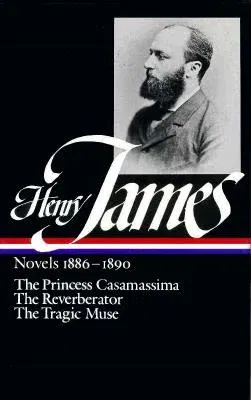The three novels in this Library of America volume from Henry James's
middle period explore some historical and social dilemmas that belong as
much to our time as to his own. The Princess Casamassima was published
in 1886, a year that saw riots of the unemployed in London. It is a
political novel in which anarchists and terrorists conspire within a
fin de siècle world of opulence and glamour. The action ranges from
palaces to slums, from London to Paris to Venice and back again. The
novel's hero, Hyacinth Robinson, is torn between his loyalty to
revolutionary causes--for which he is about to commit an act of violence
that may cost him his life--and his taste for the artistic side of
aristocratic culture, represented in part by the beautiful, wealthy,
compassionate, and yet deceptive Princess of the title. Possibly to save
Hyacinth, she becomes romantically involved with his fellow conspirator
Paul Muniment, a calculating political operative, idealistic and
treacherous by turns. Assassination plots, sexual betrayals, murder,
suicide, and the fierce play of conflicting loyalties--all these bring
into play an intricate abundance of attendant figures, like the rakish
Captain Sholto and the appealing but faithless Millicent Henning.
The Reverberator (1888) is a swiftly paced comic novel named after a
newspaper that caters to the American public's appetite for the "society
news of every quarter of the globe." Francie Dosson, the free-spirited
daughter of a wealthy Boston family, innocently provides gossip to
George Flack, a "young commercial American" who writes for the paper.
His published report imperils her engagement to Gaston Probert, whose
family is outraged by the airing of its secrets. James portrays the
collision of easily shocked Old World propriety and self-assured New
World naiveté with benevolent affection and spirited delight.
The Tragic Muse (1890) explores with a topical realism not usually
found in James the conflicts between art and politics, society and the
Bohemian life. It does so with dazzling glimpses of Parisian theater and
of London aestheticism, as articulated by the flamboyant and idealistic
Gabriel Nash. At its center are four superbly drawn characters. The
fascinating Miriam Rooth is an actress of overwhelming egotistic
vitality and dedication to her art. Her suitor, the diplomat Peter
Sherringham, is impassioned by her theatrical talent even while asking
her to sacrifice it for his career. Nick Dormer faces a similar
predicament in his engagement to the rich Julia Dallow, who wants him to
forgo his painting so as to make use of her fortune in pursuit of his
career in Parliament. Full of witty talk and vividly dramatic scenes,
the novel includes a vast array of characters such as the impressive
political matriarch Lady Dormer. Perhaps more than any of his novels, it
attests to James's recognition of the costs of any dedication, like his
own, to creative achievement.
LIBRARY OF AMERICA is an independent nonprofit cultural organization
founded in 1979 to preserve our nation's literary heritage by
publishing, and keeping permanently in print, America's best and most
significant writing. The Library of America series includes more than
300 volumes to date, authoritative editions that average 1,000 pages in
length, feature cloth covers, sewn bindings, and ribbon markers, and are
printed on premium acid-free paper that will last for centuries.

